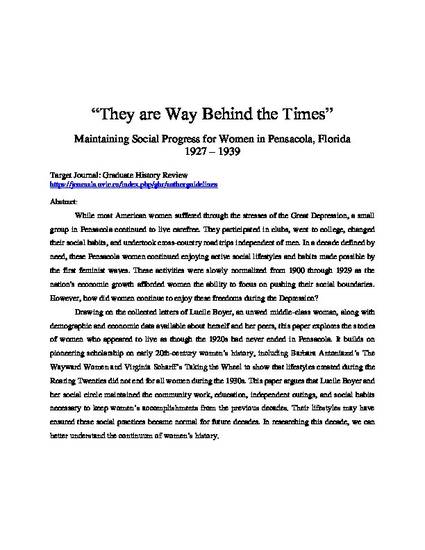
Unpublished Paper
They Are Way Behind the Times: Maintaining Social Progress for Women in Pensacola Florida
(2020)
Abstract
While most American women suffered through the stresses of the Great Depression, a small group in Pensacola continued to live carefree. They participated in clubs, went to college, changed their social habits, and undertook cross-country road trips independent of men. In a decade defined by need, these Pensacola women continued enjoying active social lifestyles and habits made possible by the first feminist waves. These activities were slowly normalized from 1900 through 1929 as the nation's economic growth afforded women the ability to focus on pushing their social boundaries. However, how did women continue to enjoy these freedoms during the Depression?
Drawing on the collected letters of Lucile Boyer, an unwed middle-class woman, along with demographic and economic data available about herself and her peers, this paper explores the stories of women who appeared to live as though the 1920s had never ended in Pensacola. It builds on pioneering scholarship on early 20th-century women’s history, including Barbara Antoniazzi’s The Wayward Women and Virginia Scharff’s Taking the Wheel to show that lifestyles created during the Roaring Twenties did not end for all women during the 1930s. This paper argues that Lucile Boyer and her social circle maintained the community work, education, independent outings, and social habits necessary to keep women’s accomplishments from the previous decades. Their lifestyles may have ensured these social practices became normal for future decades. In researching this decade, we can better understand the continuum of women’s history.
Keywords
- Women,
- Great Depression,
- Social Progress,
- Feminism,
- Southern History
Disciplines
Publication Date
Spring 2020
Citation Information
Geoffrey Ramirez. "They Are Way Behind the Times: Maintaining Social Progress for Women in Pensacola Florida" (2020) Available at: http://works.bepress.com/Geoffrey-Ramirez/1/
